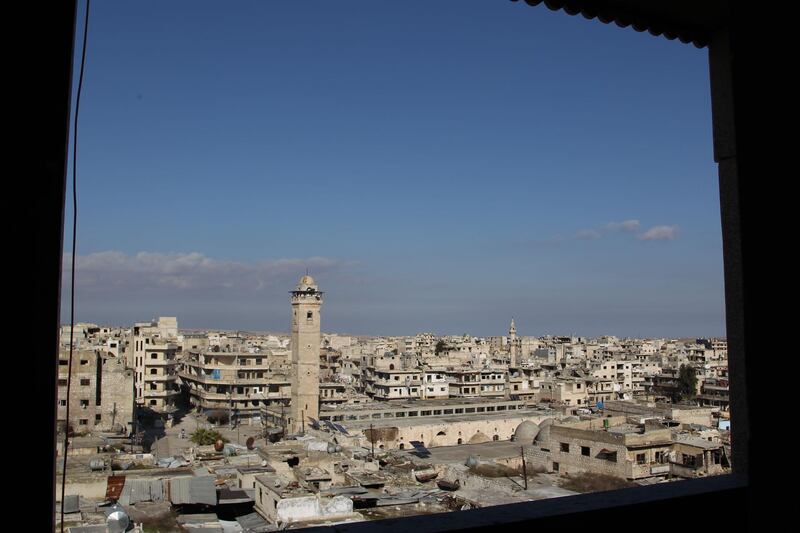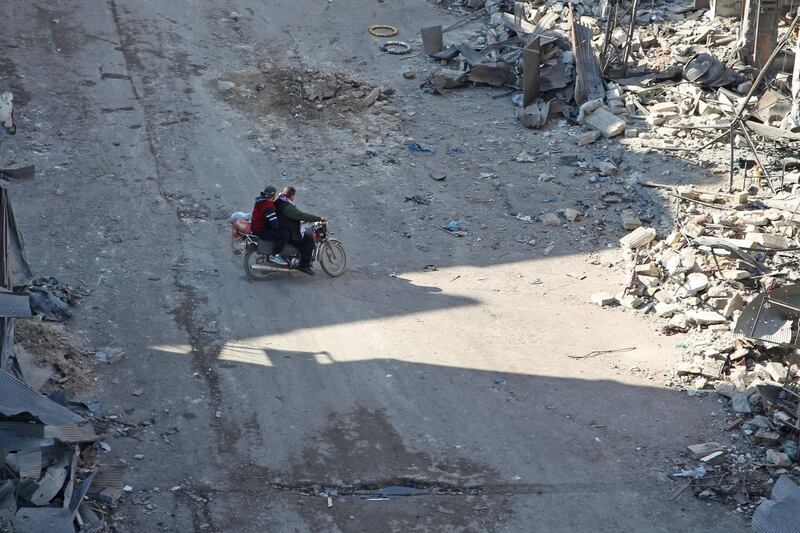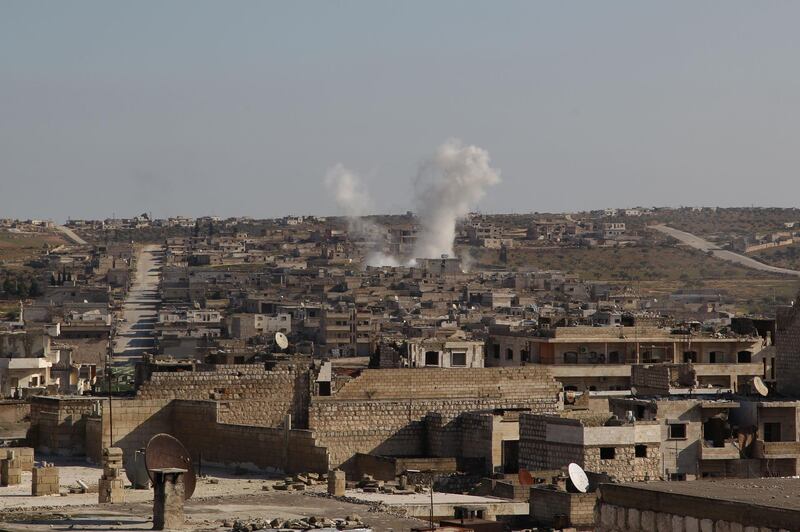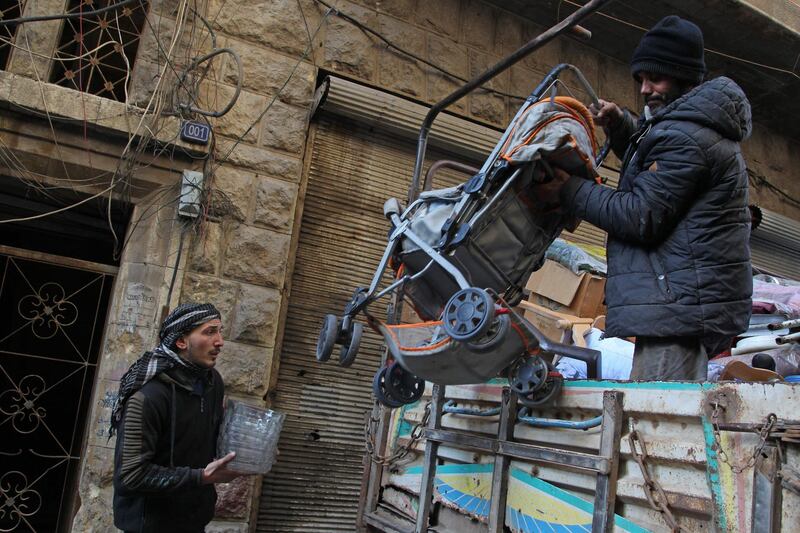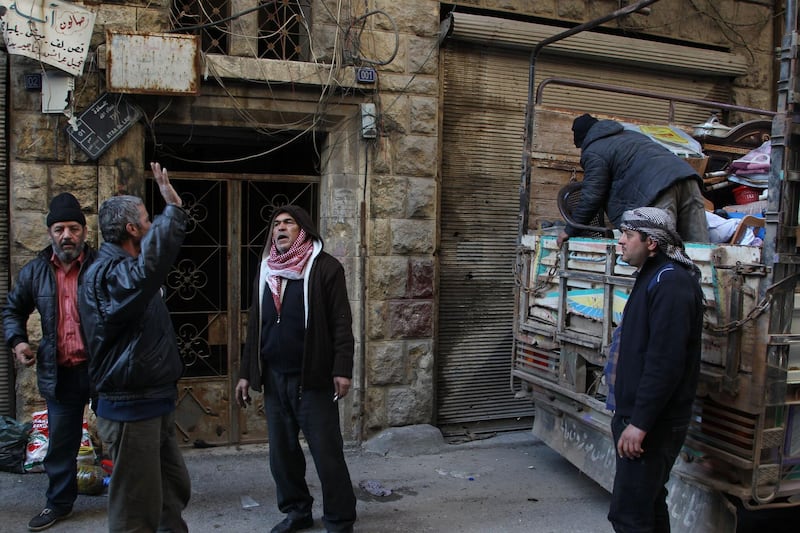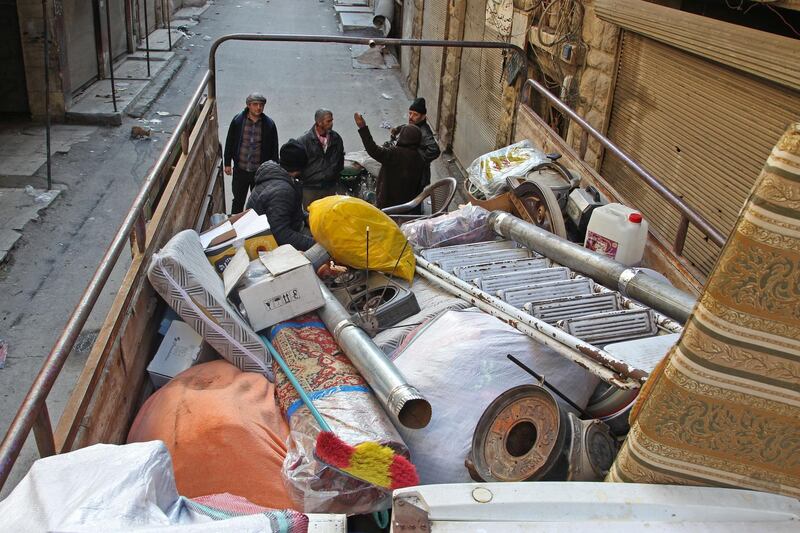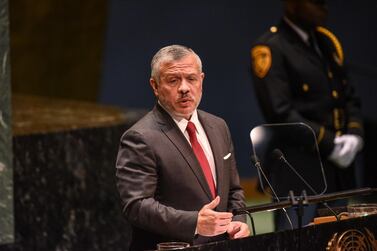Areej Husrum’s house had been destroyed twice and her husband killed by Syrian regime shelling before her and three of her seven children finally made the decision to flee their village last year.
The forty-five year old mother, now sheltering in a small camp near Raqqa, tells of her week long journey on foot from her village home south-west of Idlib as she sips tea poured by her eldest son in their makeshift tent.
"We didn't bring anything with us, just our soul," Husrum told The National, adding that she didn't know where her four other children were.
“We thought it was the last moment of our life, that last hour was so difficult for us, we gathered together and prayed to God.”
Husrum’s family is joined by more people every day, fleeing continued airstrikes on Idlib despite a ceasefire agreement.
The Syrian government and its Russian ally launched a military offensive in Idlib at the end of April last year to take control from opposition forces and Syrian rebels.
Between May and November 2019, the UN recorded the displacement of at least 630,000 people.
As the bombardment of civilian areas in Idlib by the Syrian regime and its Russian ally intensified at the end of 2019, around 300,000 people had fled the region in December alone, according to the UN.
Already overwhelmed with hosting three million Syrian refugees, Turkey pushed for negotiations with Russia for a ceasefire in Idlib, eventually coming into effect in the afternoon of January 9 as stated by a Russian defense official.
But implementation on the ground appeared non-existent, as photos and footage from bombed-out civilian areas flooded social media in the hours following.
Raed Al Saleh, the head of Syrian volunteer organisation The White Helmets said that on January 11 alone, 21 civilians had died and at least 94 were wounded.
"[On] Saturday, [Bashar Al] Assad's warplanes intensified their raids on the city of Idlib and the rest of the governorate's towns," Al Saleh told The National.
“Several air strikes by Assad's planes … targeted streets and residential neighbourhoods, and resulted in severe damage to civilian homes and vehicles.”
Already displaced, Husrum is adamant that each time a ceasefire is declared, it is always the regime that breaks it.
“There is just one reason, the regime is shelling civilians because the people are against him,” Husrum explained.
“It’s to punish people ... poor people, kids, workers, all civilians ... they shell hospitals so everyone dies.”
Al Saleh said the majority of deaths on January 11 were from air strikes in the city of Idlib, as well as the towns of Bunche and Neirab.
59 airstrikes, 29 explosive barrels bombs, 36 missiles were launched by regime forces yesterday against civilians, in what appears to be deliberate revenge against the innocent people just hours before a new truce agreed upon by #Turkey and #Russia is to begin. #Idlib pic.twitter.com/tUX98rajCR
— The White Helmets (@SyriaCivilDef) January 12, 2020
Photojournalist Samer Daaboul is based in Idlib and has made a practice of counting the number of airstrikes on the city. He listed 12 air strikes in Idlib on January 9, the day the ceasefire was announced.
It has only intensified since then, he said. On January 10, Daaboul confirmed 40 air strikes and the following day there were 99 strikes by regimes forces across Idlib.
As he listed each airstrike by exact time and place, he painfully noted six children among those killed.
Fared Al Hor, a resident of Idlib, told The National he feels any ceasefire is a farce.
“Here we do not trust the armistice because of the continued violations of the Assad and Russia militias,” Al Hor said.
“Now, the reconnaissance planes do not leave the sky of southern Idlib countryside.”
Stéphane Dujarric, the Spokesperson for the UN Secretary General said the UN was concerned for Idlib's residents.
"While a ceasefire that went into effect on 12 January has reportedly resulted in a degree of calm, intensive air strikes on 11 January in towns in the area reportedly resulted in the deaths of 21 people, including 8 children and 5 women, and the destruction of civilian infrastructure," he said.
The UN urges all parties, and those with influence over those parties, to ensure the protection of civilians and civilian infrastructure, in line with their obligations under international humanitarian law," he added.
Turkey has threated to retaliate if the regime bombings do not subside.
"We are determined to stop the [Syrian] regime's attempts to violate cease-fire [in Idlib] - ourselves if needed," President Reccep Tayyip Erdogan said on Tuesday.
"It is no joke. Everybody should see and accept that Turkey definitely does what it says," he added.
"The UN urges all parties, and those with influence over those parties, to ensure the protection of civilians and civilian infrastructure, in line with their obligations under international humanitarian law."
A regime helicopter dropped these leaflets over Idlib today, calling on civilians to head to regime-held areas through 3 crossings (see separate map). In some previous regime offensives, such claims about humanitarian crossings turned out to be untrue. There was no way to escape pic.twitter.com/WW5nc6KCab
— Elizabeth Tsurkov (@Elizrael) January 12, 2020
On Sunday afternoon, regime helicopters flew over towns in western Aleppo dropping paper leaflets in the area telling all civilians to leave via evacuation points marked into regime controlled areas.
People on the ground state this would be preparation for a major offensive to come, though the evacuation points drawn may turn out to be untrue as civilians have found in past offensives.
Husrum, with her silent and forlorn daughter Zeineb sitting by her side, expressed the terror they faced in Idlib each day, even during ceasefires.
"All the time in Idlib you are ready to die. It's up to chance, if you are lucky or not. Daily there is shelling, fighting, there is aircraft," she told The National.
“All our life was fear. Until this moment when we hear the sound of aircraft, we are scared.”
Nader Asfar, the manager of Abu Qbeaa camp in Al Tabqeh where Husrum is sheltering, told The National that Idlib is like Syria's graveyard.
"They make Idlib like a cemetery for all the fighters. They push [opposition] fighters from Damascus, Latakya, Hama, etc and gather them in Idlib at last to attack them until they surrender," Asfar told The National.
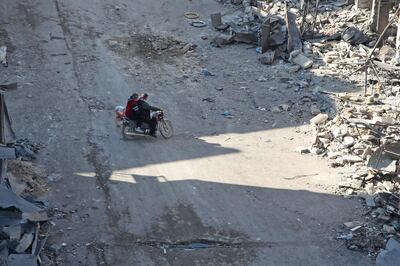
While insistently offering sweets and juice to her guests, Husrum said her family, and the entirety of the camp in Al Tabqeh, near Raqqa, receives no support from aid agencies.
The area is under control by the Kurdish-led Syrian Democratic Forces, who created an autonomous administration in north-east Syria during the course of the civil war.
Asfar explained that the families fled to SDF held territory as they were in fear of Hay'at Tahrir Al Sham, once called Al Nusra and previously affiliated with Al Qaeda, who control the north of Idlib to the Turkish border.
"So we chose this are because we’re wanted by two groups, Turkish militia and regime. This is the last choice for us," Asfar said.
Husrum only hopes that someone will help her family, and all the people who have fled Idlib over the course of the conflict.
“Of course we hope someone will help us, the kids need to go to school, some are sick, there are old men [in the camp], and there isn’t much work,” she explained.
“We need someone to help us. God willing, someone will help us, we have hope.”
